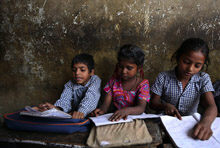
Typical street scene in Santa Ana, El Salvador. (Photo: iStock)
IMF Survey: Growth Boost Key to Reaching Global Poverty Goals
September 16, 2010
- Global financial crisis set back Millennium Development Goals progress
- Advanced countries must restore growth, keep aid promises, boost trade access
- Poorer countries should support growth policies by building resilience to shocks
The global economic crisis has set back progress toward the Millennium Development Goals and, to regain momentum, it is vital that strong and sustained global economic growth be restored, IMF economists said.

Pro-poor growth should benefit areas, sectors where poor are most numerous, IMF note says before poverty goals summit (photo: Mukesh Gupta/Reuters)
MILLENNIUM DEVELOPMENT GOALS
Both developed and developing countries will need to play their part in this endeavor, the economists said in a background note for a United Nations conference on the goals.
“Everything hinges on restoring balanced and sustainable global growth,” IMF Managing Director Dominique Strauss-Kahn said in a statement. “This is the foundation upon which everything else is built. Growth is not enough but certainly, without it, other efforts to achieve the Millennium Development Goals will be frustrated,” Strauss-Kahn added.
The note added that further actions by advanced and dynamic emerging market economies are called for to safeguard the global recovery, create a more robust financial system, and improve market access for low-income country exports.
“Of course, the developing countries’ own policies will be absolutely critical in restoring strong growth and making them more resilient to future shocks,” IMF First Deputy Managing Director John Lipsky told a panel discussing the background note September 16 at IMF headquarters in Washington D.C.
UN Secretary-General Ban Ki-moon called on world leaders to attend a summit in New York on September 20–22 to accelerate progress toward the Millennium Development Goals, which aim to cut poverty, hunger, disease, maternal and child deaths, and other ills by a 2015 deadline. Strauss-Kahn will address the summit on September 20.
More resilience to shocks
Boosting growth in developing countries is not the only remedy needed to regain momentum toward the development goals, but it is a necessary condition. Growth must be pro-poor, including through growth patterns that benefit the areas and sectors where the poor are the most numerous.
The IMF background note said low-income countries face massive financing needs to close the “infrastructure gap” and address climate change—both impediments to growth and long-term development. Aid commitments should be fulfilled, but can meet only part of these needs. Countries need to mobilize and use domestic resources more effectively, create conditions to attract foreign direct investment, and strengthen their capacity for “safe borrowing.” All these should aim at engendering private sector-led growth.
The global crisis has shown that, to achieve the development goals, low-income countries need to complement pro-growth strategies with policies that build resilience to shocks. Buffers built up through good macroeconomic policies in recent years, together with scaled-up financial support from the IMF and others, allowed developing countries to take strong countercyclical measures and helped them weather the global crisis relatively well.
Protect poor, vulnerable
“To make growth more resilient to future shocks, countries will need to rebuild the ‘policy buffers’ that served them so well in the recent crisis,” Lipsky told the Washington panel. “And they need to invest in more effective social safety nets, so that the poor and vulnerable can be better protected when shocks hit next.”
The IMF is working with countries to rebuild these policy buffers, and has reformed its own lending instruments and policies, all of which will help increase resilience to future shocks.
To return to the pre-crisis growth path, “there needs to be a sense of shared responsibility between the developing countries, the emerging and advanced economies, and the international institutions,” Lipsky said.
Free Africa Foundation President George Ayittey called for a change to “the aid-driven model” of support for Africa that was based on more foreign aid from Western donors. He told the panel discussion that Africa needed a market-driven economic model that was driven by entrepreneurship. “Entrepreneurs can be found in Africa. They are called the ‘cheetah generation,’ and it’s about time we identified them and supported them.”
Center for Global Development President Nancy Birdsall said the IMF background note was “way too modest” about economic management in low-income countries—especially in Africa—prior to the global economic crisis. Good policies had enabled these countries to manage well the effects of the crisis. “Not enough credit was given to the countries’ policy leadership,” Birdsall told the panel.
Specific actions
The IMF background note laid out specific actions needed to sustain progress towards the goals.
• Advanced and dynamic emerging market economies should focus on securing the global recovery, which remains fragile and sluggish.
• Donors should keep their Gleneagles promises on aid, open up trade—moving quickly to dismantle the walls that block exports from poorer countries—and intensify their support for fragile states.
• Developing countries should focus on restoring strong growth—by investing in infrastructure and creating a more supportive business environment—and on making their economies more resilient to shocks, by reinforcing the strong macroeconomic policies that served them so well in the recent crisis and putting in place more effective social safety nets.
The IMF will help by
• Using its reformed lending instruments to make available financial support to countries facing shocks and macroeconomic instability, and maintaining the suspension of all interest payments on concessional loans during the crisis recovery period.
• Providing advice on the macroeconomic policies needed to safeguard the current recovery and rebuild buffers to help address future volatility.
• Assisting low-income countries in developing sound strategies for scaling-up of investment, including advice on better domestic resource mobilization and “safe borrowing.”
• Providing technical assistance and support for capacity building, with a view to strengthening countries’ ability to manage resources more effectively in pursuit of their growth and poverty reduction goals.


